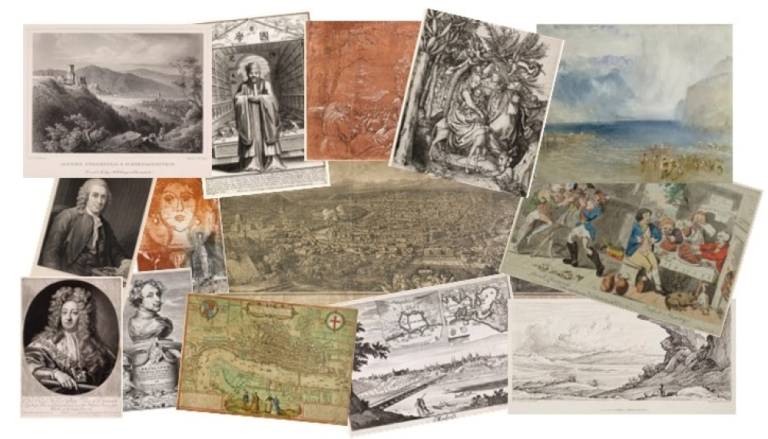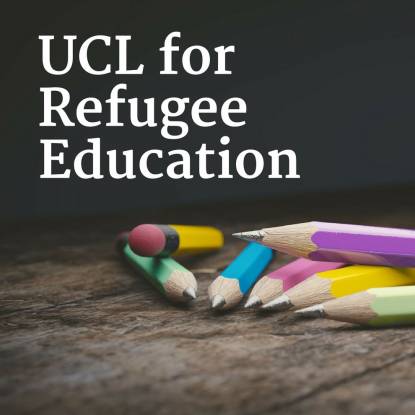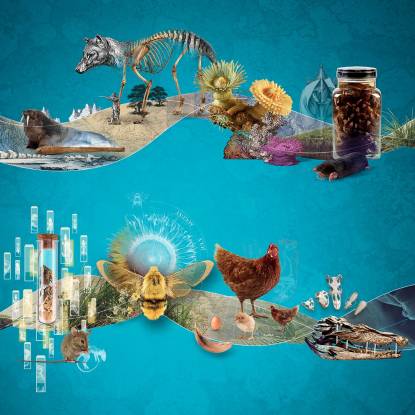European languages and cultures celebrated with two on-campus exhibitions

Today (26 September) is the 22nd annual celebration of the European Day of Languages, a Council of Europe initiative established to encourage language learning, plurilingualism and intercultural understanding, while promoting the rich linguistic and cultural diversity of Europe. Very much in the spirit of these EU-driven objectives are two exhibitions at UCL’s Bloomsbury Campus: ‘Not Just Words: Learning languages through art and objects’ reopening today in the UCL Art Museum, and ‘Lost & Found: Mapping European Literary London’ opening next month in the South Cloisters.
‘Not Just Words’ presents a new approach to encountering foreign languages, through interactive teaching videos and pieces from the UCL Art Museum collection. The showcase provides the opportunity to hear from experts from across a range of UCL faculties about the language they teach and its connection to a culturally relevant item selected from the Museum archive.
Rooted in object-based learning, ‘Not Just Words’ engages with outside-the-box teaching, presenting visitors with the opportunity to take an object or artwork as their starting point to the discovery of another language and culture. The project behind the exhibition was initially conceived as a Language and Object Show and Tell for Year 12 students during the COVID-19 pandemic, promoting language awareness and multilingualism beyond the university. It has since been transformed into the current showcase and has expanded from the European languages taught in the UCL School of European Languages, Culture and Society to other departments and languages such as Arabic, Mandarin and Finnish.
The exhibition’s academic curator Dr Elettra Carbone (UCL School of European Languages, Culture and Society) said: “The aim of the display is to showcase the benefits of this innovative object-based or, more specifically, collection-based approach to language teaching which demonstrates that language is ‘not just words’ by emphasising the connection between language and culture. I am thrilled to see the showcase reopen to the public for another term with three more languages joining the series (Ancient Greek, Hebrew and Romanian). The end of the showcase will most certainly not mean the end of this project or of our interdepartmental collaboration with UCL Art Museum, so I encourage anyone interested in joining the series to get in touch.”
In October, another exhibition, ‘Lost & Found: Mapping European Literary London’, will be opening in the South Cloisters, exploring the relationship between London and European writers through the ages. The exhibition is based on an interactive digital map, developed by the UCL European Institute, the UCL Faculty of Arts and Humanities and the UCL Bartlett Centre for Advanced Spatial Analysis, which highlights passages originally written in over 20 European languages, sourced from across the UCL community and beyond. From the end of October to May 2024, the South Cloisters will be transformed into an interactive space which brings these literary encounters to life, revealing a Europe and London of the imagination.
Dr Tim Beasley-Murray, Vice-Dean (External Engagement) for UCL Arts & Humanities said: “‘Lost & Found: Mapping European Literary London’ encourages us to reflect – both critically and playfully – on London as a place where journeys and languages intersect; where people and cultures meet and are transformed. It has been a pleasure to collaborate with the UCL European Institute and the Bartlett Centre for Advanced Spatial Analysis on such a wide-ranging and valuable project, which foregrounds the importance of both culture and languages in how we understand, and experience, the world. We look forward to using the exhibition to help diversify the range of writers featured on the Map, as well as to launch an associated Writer in Residency and schools’ engagement programme.”
Encouraging language learning and celebrating shared European heritage and linguistic diversity, these UCL exhibitions invite visitors to explore and engage with European history and culture.
‘Not Just Words: Learning languages through art and objects’ has been extended and will now run until Friday 15 December in the UCL Art Museum. Dr Elettra Carbone will be hosting a special drop-in session ‘Have you thought of learning...? Languages of the wider world’ for the European Day of Languages on Tuesday 26 September 2023, 11:00 am–1:00 pm in the Museum.
‘Lost & Found: Mapping European Literary London’ will be officially opening in the South Cloisters on Tuesday 24 October.
Links
- European Day of Languages
- Dr Elettra Carbone’s languages drop-in session
- NJW Exhibition Page
- European Literary Map of London
- Object Based Learning Lab
- UCL SELCS
- Show and Tell Videos
Image
- Selection of items used and displayed in 'Not Just Words' for object-based learning videos.
 Close
Close



